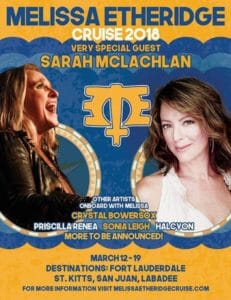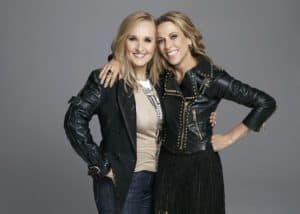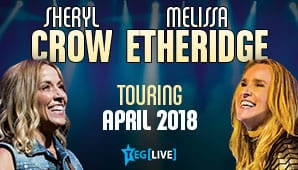Melissa Etheridge: We Have Come a Long, Long Way (Interview)
Melissa Etheridge is joining forces with Sheryl Crow for a three-date tour of New Zealand beginning April 9th at Trusts Stadium in Auckland.
It wasn’t that long ago that a show featuring two women as co-headliners was considered bad business.
The 13th Floor’s Marty Duda spoke to Melissa recently about the changes that have taken place in the music business, particularly where women are concerned, and found that those changes are both positive and negative.
Click here to listen to the interview with Melissa Etheridge:
Or, read a transcription of the interview here:
ME: Oh my gosh! I did a show last night in Bonita Springs, by Fort Meyers, and we just travelled across, today, to Fort Lauderdale, where, tomorrow, I’m getting on my Melissa Etheridge cruise boat; so, I’m just in the marina here in Florida.
 MD: So, what happens on a Melissa Etheridge cruise boat?
MD: So, what happens on a Melissa Etheridge cruise boat?
ME: … Stays on a Melissa Etheridge cruise boat.
MD: I see!
ME: You know what? What’s great about the cruise – because this is our second one – is there are so many different kinds of people. It’s like looking out in my audience, and yes, there are a lot of women – so? – and yes, there’s gay people, but there’s all kinds of people! There’s straight, there’s men and women, there are all colours, there’s all ages; and the one thing they have in common is a real kindness of heart. They really do. I think people that really get my music to that level, where they want to go on a cruise with me, they really hold the same heart space that I do; so, I feel really comfortable on the boat with everybody.
MD: Are you doing this with Sarah McLachlan?
ME: Yeah! She’s coming up this time; very excited about that.
MD: That should be quite an experience, with both of you there. People should be very excited. You’re coming out here with Sheryl Crow in a few weeks. Now, you’ve been to New Zealand a few times, Sheryl’s been here a few times, but neither of you together. How is the show working, do you know? Are you doing individual sets and anything together, or is it being separate? How is it working?
 ME: I imagine we’ll do something together. We haven’t talked about it yet, but we both are in our own little pods until we get together down there. Sheryl’s just an old friend, and we’ve done a lot of stuff together; so, I just can’t imagine not doing something together. Each of us have our equal ninety minute sets – I go on first, and then she goes on – and each of us will be doing all our hits. I’m really, really, really looking forward to it!
ME: I imagine we’ll do something together. We haven’t talked about it yet, but we both are in our own little pods until we get together down there. Sheryl’s just an old friend, and we’ve done a lot of stuff together; so, I just can’t imagine not doing something together. Each of us have our equal ninety minute sets – I go on first, and then she goes on – and each of us will be doing all our hits. I’m really, really, really looking forward to it!
MD: I think everybody here is as well; so, it should be cool! My understanding is – I did some reading – you’re working on some new music as well. Is that right?
ME: Oh yeah. That’s always the exciting and frustrating part of my career: is the, “Oh my God! Am I ever going to write another song again?” and you get under there, but… this journey, it’s different. I challenge myself, each album, differently: how I’m going to make a record, what I’m going to make – the last album was completely different of anything I’ve ever done – and so, this one, I just started writing, and I started recording it different – like, my bass player, David Santos, I recorded it in his place in Nashville, and then I was at the Concorde Record village recording studios, and I did some recording there, and now I’m working with John Shanks at his studio – and the songs have grown. I’ve written more, the picture’s getting clearer of what the album is, and I feel, again, really great about it. The thing I most concentrate on is, “Am I going to want to sing this song live in front of people?” Because that’s where I spend most of my time, and that’s where I connect with my audiences: live.
MD: Is that the process that you, generally go through when you’re making a record – to start writing, and see where it takes you – or do you, sometimes, operate with a preconceived notion about what you want to achieve, and then go from there?
ME: It has been different. There have been some that have been very preconceived, like The Awakening, Fearless Love and Scan, but then the early ones, I had the luxury of having no children, and I had all the time in the world to be a writer. I was just living the life. My songs just were part of my life, and… it was just a natural flow…. I even got to work my songs with the band on the road. It was very different, the first few albums. Then it becomes, “This is something I have to make time for,” I have to go in and think about it and plan it. So yeah, it gets a little bit more planned nowadays.
MD: Nowadays, also, people seem more reluctant to make new music, because the record sales thing isn’t what it used to be. Does that cross your mind, at all, before you decided to commit yourself to making another record?
ME: No. I come at it from a different point of view. I don’t come at it from record sales. I’ve had millions of record sales, and I, sort of, have settled into a nice, comfortable… about a hundred to two hundred thousand people will buy my records; will buy an actual product of my record. They like to look at the lyrics, they like to look at the pictures – that’s the way they like to do it – and that’s a lot for me –that’s a lot of folks. It’s an opportunity to give them that, and to put new music out, and connect…. I’m a writer! This is the way I get through my life; and especially these days, there’s so much to write about. It’s such an interesting time, and it’s very inspirational, and I look to inspire; and so, I have a purpose behind myself and these songs, and the purpose of bringing people together through the heart and get out of our heads for a minute, and really just let music bring people together. All those cliché things that are really important right now.
MD: What is inspiring you to write songs? Is it the political climate? Is it cultural stuff? What kinds of things have grabbed your attention?
ME: Well, all of that… of course, I’m influenced by the feelings that I have: my own personal feelings about the political world, and America and its democracy, and a conservative, right wing, fearful mind-set that has got into a power position. That, I see, but I don’t come at it – and I don’t think it works anymore – to buy into the ‘us and them’ – that there are only us on the left and them on the right. When we’re asking not to be put into boxes, let’s not put anybody else in a box. It’s about the experience of getting through the fear of what that whole ‘right’ represents. It’s all about fear; and so, we have to become the change. We have to say we’re fearless people, and we choose diversity, and we choose inclusion and love. That might be fearful to you, yet, let me show you how great this is! I’m happy. I’m healthy. Let me show you. So, this is the feeling I’m coming from with this record. There are personal songs. There are love songs, and there’s one called #Metoo. It is of the time right now.
MD: I’m sure – because of the audience that you attract – that… you’ll be preaching to the converted, but are there times when it does get confrontational? When there are a mixed crowd, and there is a feeling that, maybe, you have to convince someone, or at least put across an opinion…?
ME: No. It’s not my job to convince or preach to anyone. It is my job to be the best me I can be, so that I can inspire someone else. Where someone can look at me and think or fear something that I am, they can go, “Well, that’s not so scary.” “Oh, I get this,” and, “Wow! I want to be strong like that. How can I be strong like that?” To be something that people want to emulate, is very powerful.
MD: Did you watch the Grammys? Were you there? Did you pay much attention to them when they happened a few weeks ago?
ME: No, I wasn’t there. I caught some of the major performances, but I have four children, and it was hard…I think I missed out on it.
 MD: Because… I think Sheryl dived into some of the controversy around the fact that women weren’t necessarily represented properly at the Grammys, and she suggested even going back to having separate categories for men and women. I was wondering how you felt about that.
MD: Because… I think Sheryl dived into some of the controversy around the fact that women weren’t necessarily represented properly at the Grammys, and she suggested even going back to having separate categories for men and women. I was wondering how you felt about that.
ME: That has been one of the things, that when I tell people, they are like, “What?” and they shake their heads. That the category that I won two Grammys for: it doesn’t even exist anymore: that there’s no best rock female vocalist category. The answer we keep hearing is, “There’s not enough people eligible,” and that just freaks me. I’ve got enough of them on the boat with me this week!
MD: I can make a list of about fifty, right now!
ME: I know! I’m like, “What are you saying?” So yeah, it’s been an uphill climb for a long time, and I just don’t want to tell that story, over and over, about how hard it is for a woman in the music business – much less rock & roll. We have come a long, long way. That Sheryl and I can go headline our own tour like this: that’s a long way. Before, we would have been looked at as competition for each other, because there’s only one spot you can have; so, we’ve come a long way.
MD: I remember I worked in radio in the States, back in the 70s and 80s, and… when they were programming, and they were telling us what to play, you would never play two women artists back to back. That was just a no, no.
ME: … What is that saying?
MD: It was almost like a novelty; so, you wouldn’t do that. I never understood it.
ME: When I went with my first record in 1988, and we would go to the rock stations, they would say, “I’m sorry, we’re already playing a woman…” and that wasn’t so long ago.
MD: That’s true. Do you think there is actual progress being made, though?
ME: Well, the radio has completely changed. There is no rock radio anymore that’s adding rock artists. The ones that are – these alternative and independent; whatever they’re called – they’re very gender neutral – it doesn’t matter. The whole thing that’s coming up – all the independents – there’s women all over that.
MD: Rock isn’t exactly the force that it was thirty years ago. How do you feel about that? Do you feel like you’re in the margins, as far as the type of music that you’re making now? Does it make a difference, to you, how it’s being perceived?
ME: No, not at all. What I think that rock & roll is, is: the definition of rock & roll is music that incites and brings about change, and is the rebel thing outside of the norm, and I think that hip hop, right now, is that definition of rock & roll – hip hop and rap. That’s the music that I don’t want my kids listening to. That’s the rock & roll, and I’m like, “Oh my god! What are they saying?” That’s rock & roll nowadays. Little “she’s my cherry pie” looks really wimpy compared to some of the rap lyrics…
MD: This is true!
ME: Yeah…! But people still love to listen to music and be inspired, and my music is about that. It’s about songs. It’s about life; and people still love music.